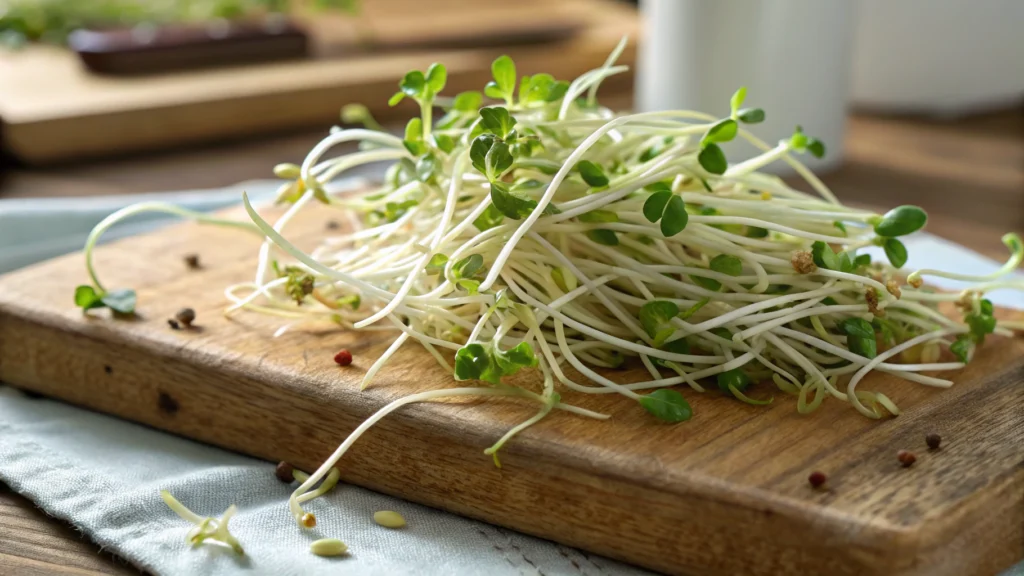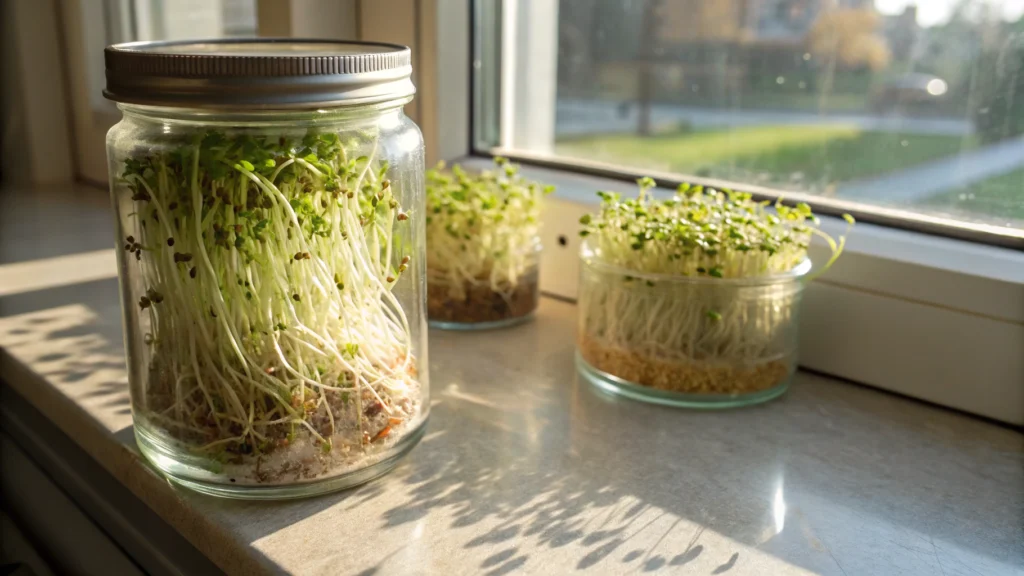Alfalfa Sprouts are the tender shoots of the alfalfa plant (Medicago sativa), harvested just a few days after germination. Known for their mild flavor and crunchy texture, they are often used in sandwiches, salads, and wraps. Alfalfa Sprouts are a popular choice among health-conscious eaters due to their rich nutritional profile and low calorie count. These sprouts are not just a garnish but a powerhouse of vitamins, minerals, and antioxidants.

🌍 Origin and History of Alfalfa Sprouts
The word “alfalfa” comes from Arabic, meaning “father of all foods,” highlighting its long-standing value as a superfood. Alfalfa itself has been cultivated for over 6,000 years, mainly as animal feed, originating in the Middle East and South Asia. However, the consumption of Alfalfa Sprouts by humans became popular in Western cultures during the health food movement of the 1960s and 1970s. Today, these sprouts are grown and consumed globally, revered for both their flavor and health benefits.
🥬 Alfalfa Sprouts Taste
Alfalfa Sprouts have a light, fresh, and slightly nutty taste. Their crisp texture makes them ideal for adding a refreshing crunch to meals without overpowering other flavors. While mild on their own, they easily absorb dressings and seasonings, making them a versatile ingredient in both raw and lightly cooked dishes.
🧪 How Are Alfalfa Sprouts Made?
Producing Alfalfa Sprouts involves germinating alfalfa seeds in a moist environment. Here’s a simplified step-by-step guide to how they’re grown:
- Soaking: Alfalfa seeds are soaked in water for 4–6 hours to initiate germination.
- Rinsing and Draining: Seeds are then rinsed twice daily and kept in a dark, humid container.
- Sprouting: Over 4–7 days, the seeds begin to sprout, forming white shoots and tiny green leaves.
- Harvesting: Once they reach 2–4 inches, the sprouts are harvested, washed, and refrigerated.
No soil or sunlight is required—just water, warmth, and a little patience.
🍽️ What Are Alfalfa Sprouts Used For?
Alfalfa Sprouts are commonly used in a wide variety of dishes due to their texture and nutrition. They are popular in:
- Salads: Add volume and crunch to mixed greens.
- Sandwiches & Wraps: Commonly added to veggie or turkey sandwiches.
- Smoothies: Blended for a nutritional boost.
- Soups and Stir-Fries: Lightly added post-cooking for a crunchy topping.
- Garnishes: Used to top avocado toast, eggs, or grain bowls.
They’re also frequently used in vegetarian and vegan recipes for added protein and micronutrients.
🔥 Is Eating Alfalfa Sprouts Good for You? (Supported by Sources)
Yes, eating Alfalfa Sprouts is generally very healthy. According to the USDA and studies published in Nutrients and the Journal of Agricultural and Food Chemistry, Alfalfa Sprouts are packed with:
- Vitamin K: Supports bone health and blood clotting.
- Vitamin C: Enhances immune function.
- Folate: Essential for cell growth and development.
- Phytoestrogens: May help balance hormone levels.
However, caution is advised due to potential bacterial contamination (e.g., E. coli or Salmonella), especially in raw sprouts. Always buy from reputable sources and wash them thoroughly.
Source: Healthline+1Nutrivore ,HealthlineNutrivore+1Frontiers+1
- U.S. Department of Agriculture FoodData Central
- “Health Benefits and Risks of Alfalfa” – Nutrients Journal, 2021

🧀 Alfalfa Sprouts Similar Foods
If you love Alfalfa Sprouts, you might enjoy these similar sprouted vegetables:
- Broccoli Sprouts: Stronger taste and higher sulforaphane content.
- Clover Sprouts: Milder and often interchangeable in recipes.
- Radish Sprouts: Spicier with a peppery kick.
- Mung Bean Sprouts: Common in Asian cooking, juicier and denser.
- Sunflower Sprouts: Nutty and rich in protein.
Each type offers unique nutritional benefits and flavor profiles, making them fun to experiment with.
🧑🍳 Famous Recipes Using Alfalfa Sprouts
Here are some well-loved recipes that incorporate Alfalfa Sprouts:
- Veggie Wrap with Hummus and Alfalfa-Sprouts
- Turkey and Avocado Sprout Sandwich
- Sprouted Salad Bowl with Quinoa and Tahini Dressing
- Alfalfa Sprout & Egg Breakfast Toast
- Sprout Spring Rolls with Peanut Sauce
- Kale, Sprout & Apple Smoothie
- Spicy Tofu Stir-Fry with Alfalfa Garnish
- Raw Veggie Pizza with Sprout Topping
- Lentil and Sprout Patties
- Sprouted Chickpea Salad
These recipes not only enhance meals with flavor and crunch but also add a boost of nutrients to your daily diet.
❓ 10 FAQ About Alfalfa Sprouts
Do alfalfa-sprouts help with digestion?
Yes, thanks to their fiber and enzyme content.
Are alfalfa-sprouts safe to eat raw?
Yes, but ensure they’re from a clean, reliable source to avoid foodborne illness.
How long do alfalfa-sprouts last in the fridge?
Typically 4–7 days when stored in an airtight container.
Can I grow alfalfa-sprouts at home?
Absolutely! All you need are seeds, water, and a sprouting jar or tray.
Are alfalfa-sprouts gluten-free?
Yes, naturally gluten-free.
Do alfalfa-sprouts contain protein?
Yes, they contain a small but beneficial amount of plant-based protein.
Can I cook alfalfa sprouts?
Yes, but light cooking is recommended to preserve nutrients.
Are alfalfa-sprouts keto-friendly?
Yes, they are very low in carbs and fit a ketogenic diet.
Can I eat alfalfa-sprouts daily?
Yes, in moderation. Overconsumption of phytoestrogens may affect hormone balance.
Are they safe during pregnancy?
Raw sprouts are not recommended during pregnancy due to contamination risk unless thoroughly cooked.
you may like

please don’t forget to leave a review
